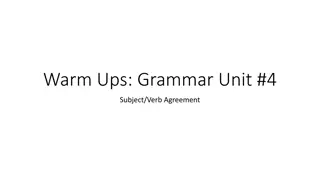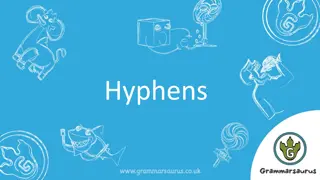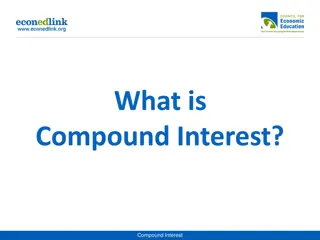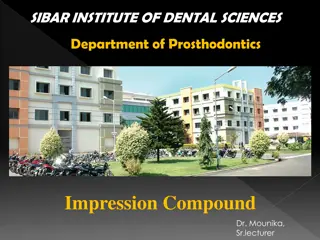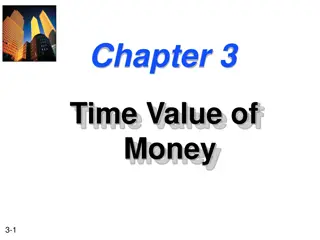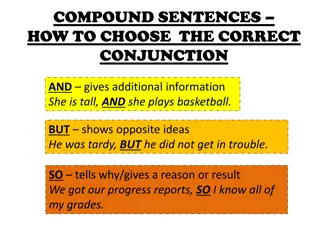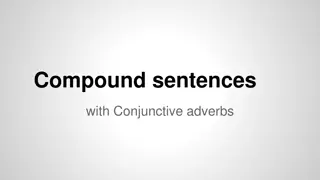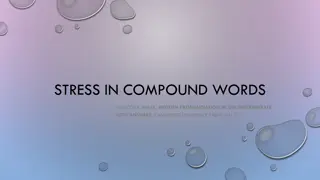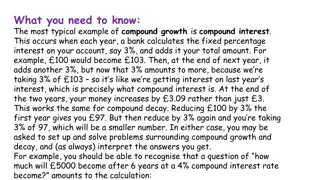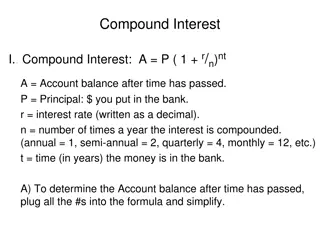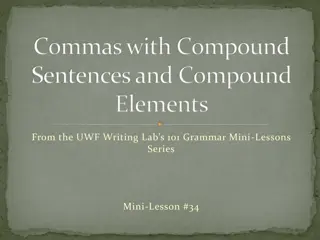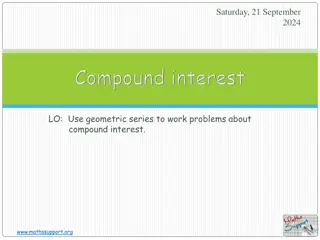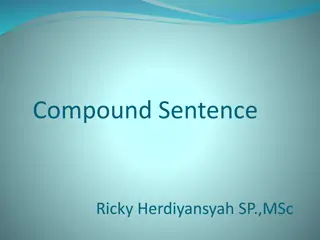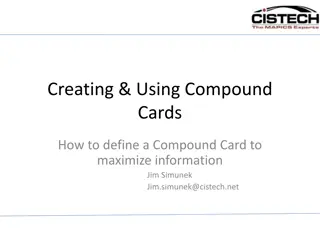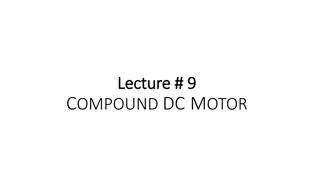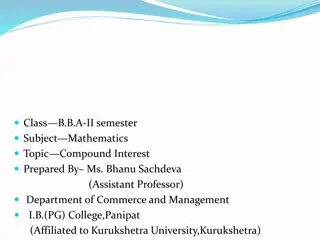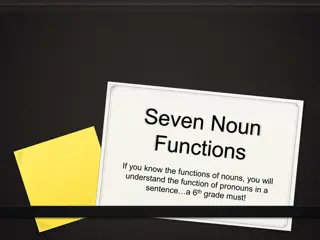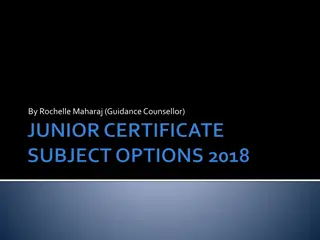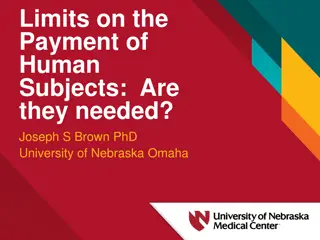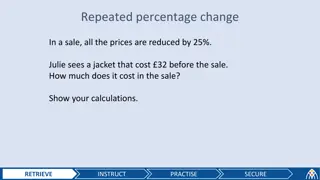Factors That Help You Select The Most Appropriate Purging Compound Supplier
Are you running a plastic manufacturing & processing unit? It is crucial to utilize a high-quality Purging Compound to ensure efficiency and cleanliness in your production machines & equipment.\n\nFor more info visit: \/\/ \/purging-compound\/
1 views • 6 slides
Subject/Verb Agreement Practice Exercises
Practice identifying subjects and verbs, and correcting verb agreement errors in sentences. Examples include singular/plural subjects with corresponding verbs and compound subjects. Improve your understanding of subject-verb agreement through interactive exercises.
0 views • 5 slides
Mastering the Use of Hyphens in Compound Adjectives
Hyphens play a vital role in creating compound adjectives by joining words together to form longer descriptive phrases. This guide provides tips on identifying, using, and creating compound adjectives with hyphens to enhance your writing skills. Discover the importance of hyphens in maintaining clar
0 views • 8 slides
Sentence Structures: Simple, Compound, Complex, and Compound-Complex
Learn about the different types of sentence structures - simple, compound, complex, and compound-complex - through examples and definitions. Understand the components of clauses and sentences, including independent and dependent clauses, to enhance your understanding of English grammar.
2 views • 11 slides
Understanding Light Perception in Insects
Insects perceive light through various receptors such as compound eyes, ocelli, and stemmata. Compound eyes, made up of ommatidia, play a key role in capturing light stimuli ranging from UV to red wavelengths. Different types of compound eyes, like dioptric and holoptic, form images differently for
3 views • 12 slides
Recrystallization for Solid Organic Compound Purification
Recrystallization is a laboratory technique used to purify solids based on their different solubilities. It involves dissolving an impure solid in a suitable solvent, cooling the solution to allow pure crystals to form, filtering to isolate the purified solid, and drying it. Finding a good recrystal
1 views • 11 slides
Understanding Compound Interest and Simple Interest Formulas
Interest rates play a crucial role in financial transactions. Compound interest is earned on both the principal and accumulated interest, while simple interest is earned solely on the principal amount. Different compounding frequencies affect the overall interest earned. Learn how to calculate simpl
1 views • 14 slides
Understanding Impression Compound in Dentistry
Impression compound is a key material in dentistry used for making negative reproductions of teeth and surrounding structures. It plays a crucial role in the fabrication of dentures, crowns, bridges, and orthodontic appliances. The accuracy of the impression directly impacts the fit and functionalit
3 views • 17 slides
Understanding Compound Interest in Class VIII Mathematics
In this chapter, students will learn about simple interest and compound interest, memorize their formulas, derive compound interest formula from simple interest concept, calculate compound interest with different compounding frequencies, understand growth and depreciation concepts, and derive formul
1 views • 29 slides
Understanding Nuclear Reactions: A Comprehensive Overview
Nuclear reactions involve direct and compound scenarios, with direct reactions occurring in a short period and compound nucleus reactions leading to long-lived excited states. Different types of reactions like elastic scattering, break-up, and compound nuclear reactions are discussed, highlighting t
5 views • 11 slides
Understanding the Time Value of Money: Simple vs Compound Interest
Explore the importance of time in financial decisions, the difference between simple and compound interest, and how it affects the future value of your investments. Learn about the formulas for simple interest, examples of its application, and the significance of compound interest for maximizing ret
1 views • 60 slides
Understanding Compound Words and Phrases in Morphology & Syntax
Exploring the differences between compound words and phrasal words in linguistics, this content delves into how roots combine to form compounds and how phrasal words function syntactically. Through examples like "green house" versus "greenhouse," as well as stress and semantic criteria, the distinct
1 views • 51 slides
Mastering Simple and Compound Sentences: Rules and Examples
Explore the world of simple and compound sentences through detailed explanations, examples, and rules. Learn how to identify, structure, and transform sentences from compound to simple form. Enhance your understanding of sentence construction and improve your writing skills.
0 views • 17 slides
Mastering Compound Sentences: Choosing the Correct Conjunctions
In compound sentences, choosing the correct conjunction (AND, BUT, SO) is essential to convey the intended relationship between ideas. This task involves matching sentence endings to conjunctions, understanding how each conjunction functions in forming connections between clauses. Through examples a
0 views • 8 slides
Understanding Sentence Structure: Phrases, Clauses, and Compound Sentences
Learn about phrases, clauses, simple sentences, conjunctions, and compound sentences in English grammar. Understand the differences between independent and dependent clauses, how to form compound sentences using conjunctions, and practice writing sentences about Justin Bieber. Explore the components
1 views • 21 slides
Junior Cycle Subject Choices and Career Pathways Overview
Explore the core, optional, and non-exam subjects offered in the Junior Cycle curriculum, including subjects such as Gaeilge, English, Mathematics, and more. Learn about the potential career pathways associated with subjects like French, Spanish, Business Studies, and Geography. Discover how these s
0 views • 20 slides
A Guide to Using Conjunctive Adverbs in Compound Sentences
A conjunctive adverb is an adverb used to connect clauses or parts of a sentence. When joining compound sentences with conjunctive adverbs, use a semicolon and a comma. Examples and guidelines are provided for proper usage. Practice formulating compound sentences with conjunctive adverbs to enhance
0 views • 7 slides
Understanding Stress in Compound Words for English Pronunciation
Explore the rules of stress placement in compound words in English pronunciation. Learn how stress can shift based on word combinations and types. Discover the differences in pronunciation between compound words, adjectives, nouns, and verbs for accurate spoken English.
0 views • 4 slides
Welcoming Students to Tretherras: Key Dates, Subjects, and Pathways
Tretherras welcomes students with upcoming key dates, compulsory and optional subjects, including EBacc subjects that are highly valued by universities and employers. Students must choose between two pathways, each with core subjects and specific subject requirements. The guidance emphasizes the imp
0 views • 17 slides
Understanding Subject-Verb Agreement
Master the rules of subject-verb agreement for singular and plural subjects, irregular verbs like be, have, and do, and compound subjects. Learn how to match singular subjects with singular verbs and plural subjects with plural verbs, and understand verb forms for different scenarios. Explore exampl
0 views • 40 slides
Subject Selection Process at Cumberland High School
Explore the wide range of opportunities available at Cumberland High School for subject selection, including core subjects like English, Mathematics, Science, Geography, and History, as well as elective subjects across various disciplines. Learn about the elective subjects offered in areas such as H
0 views • 21 slides
Understanding Compound Subjects in Grammar
Compound subjects joined by "and" usually require plural verbs, while compound subjects joined by "or," "nor," "either or," or "neither nor" may be singular or plural depending on the subject closest to the verb. Recognizing when to use singular or plural verbs with compound subjects is essential fo
0 views • 5 slides
Understanding Compound Growth and Decay Through Examples
Compound growth and decay, specifically compound interest, involve calculating interest on a changing total amount over time. This concept is illustrated through various examples and equations, showcasing how investments or values increase or decrease with each period. Learn how to solve problems re
0 views • 9 slides
Understanding Compound Interest Formulas and Examples
Compound interest is a powerful concept in finance that calculates the growth of an investment over time. This summary explains the formula for compound interest, how to calculate account balances and interest earned, and examples for various scenarios. You'll also learn how to solve for the princip
0 views • 7 slides
Mastering Commas in Compound Sentences
Learn how to effectively use commas in compound sentences and compound elements. Discover when to include commas before coordinating conjunctions that separate complete sentences and when it's appropriate to leave them out for short sentences. Understand when not to use commas when coordinating conj
0 views • 4 slides
Understanding Compound Interest: A Practical Guide
Compound interest is a powerful financial concept that can significantly impact your savings and investments. This guide explains how compound interest works using geometric series and provides a step-by-step solution to a compound interest problem. Learn about the types of interest, the difference
0 views • 26 slides
Understanding Compound Inequalities: Solve, Graph, and Interpret
Explore compound inequalities, learn to solve them step by step, graph the solutions, and grasp the concepts of "and" and "or" in the context of mathematics. Practice solving and graphing various compound inequalities for a clearer understanding of how they work.
0 views • 26 slides
Understanding Compound Sentences: Examples and Usage
A compound sentence is a group of words containing a subject and a predicate, expressing a complete idea. It can be brief or extended with qualifiers. Independent clauses are combined with coordinating conjunctions like "and," "but," or "or" to form compound sentences. Semicolons and transitional ex
0 views • 8 slides
Understanding Compound Cards for Maximum Information Utilization
Compound cards offer a versatile way to present and manage information in a structured manner. They are akin to workbenches but in a compact card format, allowing for efficient display of details across 2 to 4 sections. Learn how to define, create, and utilize compound cards effectively to enhance i
0 views • 31 slides
Comparison of Compound DC Motors and Their Characteristics
Compound DC motors, including cumulative, differential, and compound configurations, offer unique operational features based on how the series and shunt field windings are connected. Cumulative compound motors provide improved torque characteristics but lower speed, while differential compound motor
0 views • 12 slides
Understanding Compound Interest in Mathematics
This detailed content explains the concept of compound interest in mathematics, covering key terms like moneylender, borrower, principal, rate, and amount. It also delves into simple interest, types of interest, and provides formulas for calculating compound interest based on different scenarios. Pr
0 views • 12 slides
Understanding Nouns, Subjects, and Direct Objects in Grammar
Nouns are versatile parts of speech that can function in various ways, including as subjects and direct objects in sentences. Subjects usually perform actions, while direct objects receive the action of the verb. This content explores the roles of nouns, subjects, and direct objects in sentences wit
0 views • 36 slides
Choosing Subjects Wisely for Junior Certificate Success
Students must carefully select subjects for their Leaving Certificate to shape their future career. Keeping options open by choosing a variety of subjects, focusing on personal strengths and interests, and avoiding influence from others is crucial. The new Junior Cycle emphasizes assessment through
0 views • 36 slides
Exploring Leaving Cert Subject Choices at Temple Carrig School
Discover the detailed schedule and core exam subjects of the Leaving Cert Subject Choice Evening at Temple Carrig School. Learn about the curriculum options, core and additional subjects, and the process to select subjects. Explore optional subjects like Computer Science and P.E. for Leaving Cert. G
0 views • 29 slides
Examining Payment Limits for Human Subjects Research
This article explores the necessity of setting limits on payment for human subjects in research. It delves into the role of Institutional Review Boards (IRBs) in protecting subjects and the balance between benefiting subjects and advancing research. It discusses how payments can increase participati
0 views • 26 slides
Understanding Repeated Percentage Changes in Sales and Investments
This content covers examples and calculations related to repeated percentage changes in sales and compound interest investments. It explains how prices are affected when all items are reduced by a certain percentage in sales, as well as scenarios involving compound interest investments over multiple
0 views • 17 slides
Grammar on the Go! Unit 5 Lesson 7 Sentence Corrections & Clauses
This content focuses on sentence corrections in red, defining vocabulary words, and understanding different types of sentences such as compound, complex, simple, and compound/complex. It also covers identifying sentence types like declarative, imperative, interrogative, and exclamatory. Additionally
0 views • 9 slides
Evolution of Ethics in Human Subjects Research
Human Subjects Research (HSR) or Human Subjects Use (HSU) plays a vital role in medical research, with a historical background and strict ethical guidelines in place. From past atrocities to contemporary practices, the use of human subjects has evolved, emphasizing the importance of informed consent
0 views • 26 slides
Understanding the Options Process for Year 9 Students
This guide provides insights on the structured approach to Year 9 Options Evening, detailing changes in GCSEs, the new grading scale, core subjects, option subjects, choices available, and the specific GCSE option subjects students can select. Key information such as the shift from A*-G to 9-1 gradi
0 views • 17 slides
Guidelines and Procedures for Human Subjects Research at SUNY Oswego
Guidelines and procedures for conducting research with human subjects at SUNY Oswego are outlined by the Human Subjects Committee. The mission is to protect all subjects, especially students and vulnerable populations. Researchers must comply with regulations for the ethical conduct of studies invol
0 views • 15 slides

